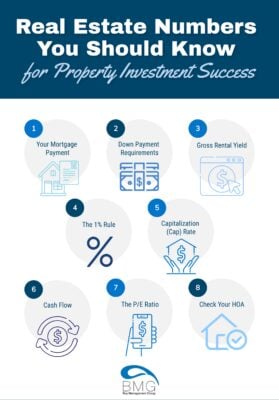Getting into the rental property business is exciting, especially if you are a new landlord. With the dream of making money, whether just to supplement your current income or become financially independent from the grind of the corporate world, there is much to look forward to!

Luckily, most people who make rental property investments succeed over time. With some hard work and determination, earning a steady flow of income is attainable. There are, however, some important financial considerations to make before jumping into a property investment. Today, we will look at some of the most crucial real estate numbers associated with rental property investment success that you should know before joining the landlord ranks.
8 Real Estate Numbers to Know
Investing in real estate takes a lot of time, research, and due diligence, especially if you’re just starting out. That said, investors must know how much they need for an investment and how much they could potentially make off an investment property.

Luckily, there are several ways to run these numbers so you and your Northern Virginia rental property management team can keep tabs on your money at all times. Here are some of the top real estate numbers to keep track of.
- Your Mortgage Payment
- Down Payment Requirements
- Gross Rental Yield
- The 1% Rule
- Capitalization (Cap) Rate
- Cash Flow
- The P/E Ratio
- Check Your HOA
Your Mortgage Payment
Although it seems obvious you would know your mortgage payment when purchasing a rental property; there is more to it than just knowing a price tag.
Before working with a lender, it is not only good to know the purchase price of the home you are interested in but also how it matches up to your debt-to-income ratio, as well as your cash reserves. The lower the ratio, the better your chances of getting loan approval. Similarly, the more savings you have set aside for maintenance, repairs, taxes, and HOA fees, the better.
With ratio requirements ranging between 28-45%, along with a high credit score and cash on hand, you must be qualified to invest if you want to get approved to buy a rental property. Plan so that you are financially secure before making any property investments.
Down Payment Requirements
Unlike owner-occupied homes, investor mortgages typically require larger down payments to secure a sale. Sometimes requiring as much as 40% down, investment properties command a lot of upfront costs. In addition, you may not use a gift fund for either the down payment or the closing costs of an investment property.
Your credit scores, debt-to-income ratio, cash on hand, purchase price, and estimated monthly rent of the property will determine how much money down you will need to make your dream of becoming a landlord a reality.
Gross Rental Yield
A great way to help decide whether an investment is good is by calculating the property’s gross rental yield to get a general expected annual return. Simply divide the annual expected rent by the total property cost, then multiply it by 100 to get the percentage.

Anything above 10% is a great rental investment worth your consideration. For instance, if you pay $100,000 for a house and you can earn $12,000 per year for the house, the gross yield is 12%.
Keep in mind while calculating that the total property costs consist of the purchase price and closing costs and do not include any deductions such as maintenance, vacancies, taxes, insurance, etc.
The 1% Rule
A quicker way to decide if an investment has potential is to apply the 1% rule to the property you are interested in.
Ideally, you would like to be able to collect 1% or more of the purchase price in rent each month. So, if you bought a rental for $100,000, you would need to collect $1,000 or more each month for it to be considered a good deal.
Capitalization (Cap) Rate
A step up from the gross rental yield and a more accurate description of your expected returns is the cap rate. This real estate number considers all operating expenses for your property and attempts to give you an idea of how much income to expect.
Calculating the number is just as easy as calculating the gross rental yield. Simply start with the annual rent and deduct any expected yearly expenses. This will provide you with a net operating profit. Then, divide that number by the total property costs (purchase price and closing costs) and multiply it by 100 to get your percentage. The higher the percentage, the better rate of return and the more successful you will be.
Cash Flow
For your investment to be successful, you must have an overall positive cash flow. This is not to say that you can never be in the red because you can and you will, but the point of investing in rental properties is to come out ahead.
As such, you’ll want to ensure your monthly rent payments cover the mortgage, interest, taxes, and insurance. Anything left over is your positive cash flow and is how you make money. Understand that maintenance costs and repairs can creep up on you quickly and damage your positive cash flow instantly, so be prepared.
The P/E Ratio
As one of the most widely used indicators of a good investment in all financial sectors, the P/E Ratio (or price-to-earnings ratio) is used to compare differing investments on a more level playing field.

This real estate number is useful in determining whether a rental property purchase is good or not. To calculate the P/E ratio, just divide the current market value of the property by the current net operating profit (remember, above, you used this value to calculate the capitalization rate). The number you receive is around how many years of net operating profit years it would take to get back your original investment.
For example, if you purchased a property for $100,000 and made a net operating profit of $8,000 a year, it would take about 12.5 years of tenant payments to get back your original $100,000. This does not consider any extra expenses you may have to put into your investment, nor does it calculate rent increases. However, it gives you a good idea of whether your investment option is worth considering.
The average P/E rates for solid investments range from 12-25. The lower the P/E rate, the better it is for someone looking to purchase a rental property.
Check Your HOA
When making a rental property investment in a neighborhood with a homeowners’ association (HOA), taking stock of their financial health is very important. Asking for the HOA’s financial statements will give you an idea as to how stable the neighborhood is.
If the HOA is in the red, you will likely see poor maintenance of the neighborhood or a spike in HOA fees, neither of which you will want to contend with. You also want to avoid investing where the HOA is in litigation. This type of situation can negatively affect your tenants and may cause you to have some unexpected vacancies.
Track Your Numbers With Professional Management
In the end, understanding some of the most prevalent real estate numbers will allow you to make an informed decision when it comes to your rental property investments. It is important to understand, however, that these numbers are not concrete. Many things can change over the course of a year, and you may find yourself starting out with what seemed like a great investment in the beginning and ending with a problem investment whose value simply dropped.
Need More Advice? contact us today!
While you cannot avoid market fluctuations and unexpected costs associated with rental properties, you can help secure some things by using a good property management team like Bay Management Group. Helping you find high-quality tenants, routinely inspecting your property for damages, and even supporting you should be needed to file a lawsuit. Many unexpected costs will never become a reality because Bay Management Group will be warding them off from the start! Contact BMG today to learn more about our services throughout Baltimore, Philadelphia, Northern Virginia, and Washington, DC.
